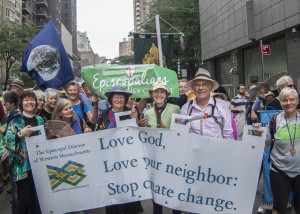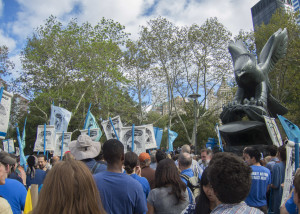I have been speechless for the past three days.
OK, not exactly speechless. I have been immersed in email, so that counts as words.

But after the weekend’s “Religions for the Earth” conference in New York City, which brought together more than 200 religious and spiritual leaders from around the world to voice our concerns and commitments regarding climate change; after the conference’s powerful multi-faith service at the Cathedral of St. John the Divine; after the People’s Climate March on Sunday, which surpassed all expectations when 400,000 people surged through the streets of Manhattan; and after Flood Wall Street the next day, in which perhaps 2,000 demonstrators poured into the financial district and more than 100 people were arrested in a peaceful, passionate uprising to protest carbon pollution and carbon profits – after participating in all these events, any one of which would be enough to change a life, something deep within me fell silent. At a soul level, I had nothing to say. I wanted only to marvel in silence.
Years ago someone told me that when Leo Tolstoy saw the ocean for the first time, all this man of words could say was: “It’s big.”
I’m no Leo Tolstoy, but I understand such reticence. When for the first time you see something as deep, wide, and alive as an ocean, words fail. You want to gaze in silence. You want to bow with amazement and respect.
Here’s what I can say, three days after coming home: I saw an ocean in New York.
It was deep: deep in prayer. Deep in grief, conviction, and resolve.
I heard an indigenous woman keen a lullaby to the children of the future who may never be born.
I heard an elder from Greenland tell a hushed crowd at the Cathedral of St. John the Divine that when he was a child, the ice was 5 kilometers thick. Sixty-seven years later, the ice is 2.5 kilometers thick. “I carry the wisdom of the ice,” he told us. “It is too late. The big ice is going away. Our only hope is that you begin to use your vast knowledge wisely. We must melt the ice in the heart of man.” It was time now, he said, to call upon the ancestors. He pulled out two thin circular drums, placed them against his cheeks like a megaphone, and began to wail. His long, deep call echoed through time and filled every space. From where I was sitting, his face was hidden. He was nameless, ego-less, as anonymous as the psalmist who cries, “Out of the depths have I called to you, O LORD” (Psalm 130). His ardent plea carried the universal prayer of every heart that longs for life as we know it to continue on this earth. “Lord, have mercy,” I prayed in union with his plea. “O God, make speed to save us. O Lord, make haste to help us.”
I heard the chair of the Intergovernmental Panel on Climate Change appeal to the world’s religions to speak boldly about the most urgent moral issue of our time. “This power has to be a spiritual power. This has to be an ethical force.”
I heard a man who marched with Martin Luther King, Jr. in the 1960’s and who spent his long life dedicated to the struggle for justice tell a group of Christians that the time has come for everyone who cares about stabilizing the climate and building a livable future to “Organize. Strategize. Mobilize.” At the Cathedral service, I heard his resonant declaration: “The civil rights movement and the human rights movement have now joined the climate movement. We are the rock of this movement. We will never stand down.”
It was wide: brimming in size and wildly diverse.
Four hundred buses headed to New York from all over the country, including more than 50 buses from my home state, Massachusetts, and a bus of Episcopalians from western Massachusetts and Connecticut who celebrated Holy Communion along the way (thank you, the Rev. Stephanie Johnson, for helping me organize that bus!). Also arriving in New York were people from the world’s front-line communities, the regions suffering most from the initial effects of climate change, among them Micronesia, Guatemala, India, New Zealand, and the Philippines. So many people filled the streets of Manhattan that the preliminary count of 310,000 marchers had to be revised upward, to 400,000 – certainly the largest climate march ever. Over the same weekend, more than 2,800 solidarity events were held in over 160 countries around the world. (To view some of those beautiful march pictures, click here.)
It wasn’t just the numbers that took my breath away – it was also the diversity. There were scientists and students, anti-fracking and anti-war groups, indigenous people and urbanites, grandmothers and children, medical doctors and social justice activists, celebrities and people from historically under-served communities – waves of people from every walk of life, all of us united in the urgent call to governments and the U.N. to take strong action for climate justice and sustainability.
The signs that people carried were as diverse as the people carrying them: funny and poignant, angry, sad, and quirky. At least two writers created poetry from the signs’ messages, including Terry Tempest Williams (The Orion Blog: River Walkers) and a local friend, Nick Grabbe (Adventures in the Good Life: Climate Change Kills Kittens).
About 10,000 people marched in our interfaith contingent. So many different faith groups were represented that a thoughtful volunteer created 38 small flags for each group to carry, alphabetized from A-Z (Agnostic to Zoroastrian). All of us marched together: Greek Orthodox and Pagan, Jew and Muslim, Pentecostal and Sikh, Buddhist and Mennonite. A handmade Noah’s ark was stationed alongside an inflated replica of a mosque. (For a photographic essay about the Ark’s journey through the streets, visit “A priest, a rabbi, an imam, and a unicorn got on an Ark to save our planet”).
It was alive: filled with energy and generating new possibilities.
The march was timed to coincide with the U.N. climate summit in New York, and a host of significant events rose up alongside, like mighty ocean waves.

The protesters and the acts of non-violent civil disobedience on Wall Street gave voice this week to everyone who wants a fossil-free economy and an economic system that heals the chasm between rich and poor.
The Rockefeller family, whose legendary wealth flowed from oil, announced its decision to divest its $860 million philanthropic fund from fossil fuels.
Archbishop Desmond Tutu and more than 80 of the world’s leading theologians, ethicists and religious leaders released a statement supporting fossil fuel divestment and clean energy reinvestment by faith communities. “To serve as custodians of creation is not an empty title,” Tutu said in a video released this week. “It requires that we act, and with all the urgency this dire situation demands.”
A Pastoral Message on Climate Change was issued this week by the heads of the Anglican Church of Canada, The Episcopal Church, Evangelical Lutheran Church in America, and Evangelical Lutheran Church in Canada. Worth reading carefully, the statement declares: “God, who made the creation and made it good, has not abandoned it. Daily the Spirit continues to renew the face of the earth. All who care for the earth and work for the restoration of its vitality can be confident that they are not pursuing a lost cause. We serve in concert with God’s own creative and renewing power.”
Meanwhile, there are things that all of us can do right away. I invite you to add your voice to a new initiative, OurVoices.net, by which millions of people around the world can register their commitment to pray for the success of the 2015 U.N. climate talks in Paris. The U.N. climate leader, Christiana Figueres, is asking for everyone’s spiritual and moral support of this initiative.
Those of us who live in western Massachusetts have an opportunity on Monday evening, October 20, to march to the steps of City Hall in downtown Springfield and to urge City Councilors to pass a resolution calling on the city to create a strong climate action plan (for updates, please check Climate Action Now).
Faced with a crisis that threatens all living beings, human and non-human alike, will humanity unite at last to create God’s dream of Shalom and to form the beloved Earth Community? Will we respond at last to the call to organize, strategize, and mobilize?
I take heart from the prophet Isaiah, who perceives God as coming to us from the future, making all things new. God speaks through Isaiah, saying: “Do not remember the former things, or consider the things of old. I am about to do a new thing; now it springs forth, do you not perceive it?” (Isaiah 43:18-19).
The planet is rapidly warming. Species are going extinct. Sea levels are rising. But another kind of ocean is rising, too: an ocean of love and concern, an ocean of commitment and resolve that is bringing together all kinds of people who are willing to engage in the struggle for a just and habitable world.
Al Gore, one of the Cathedral speakers, quoted the Wallace Stevens poem that begins:
After the final no there comes a yes
And on that yes the future world depends.
I will remember September 21, 2014, as a day when humanity said Yes. In the days ahead we will have plenty of opportunities to repeat that Yes, again and again, with our lips and in our lives.
We have a long struggle ahead of us. I hope that all of us will discover what it’s like to rise up like an ocean, deep and wide and alive.
To view some of the plenary sessions and workshops from the conference “Religions for the Earth,”held at Union Theological Seminary from Sept. 19-21, 2014, and sponsored by Union Theological Seminary, the World Council of Churches, and several other major religious organizations, go here.
To view the multi-faith service held on Sept. 21, 2104, at the Cathedral of St. John the Divine, which served as the finale of the “Religions for the Earth” conference, go here.
At the service, religious and spiritual leaders from around the world joined with activists, artists, scientists, community leaders, and government officials in a ritual of covenant and commission to protect and care for the Earth. Speakers included Former Vice President Al Gore, Rev. Jim Wallis, Chief Arvol Looking Horse, Dr. Vandana Shiva, Rabbi Ellen Bernstein, and more.
The man who prayed to the ancestors is Uncle Angaangaq Angakhorsuaq, Founder, IceWisdom International/Eskimo-Kalaallit Elder. The man dedicated to civil and human rights is the Rev. Dr. Gerald Durley, Pastor Emeritus, Providence Missionary Baptist Church.
